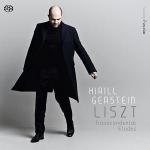|
Back
08/01/2016
Franz Liszt: Etudes d’exécution transcendante, S. 139 (1852)
Kirill Gerstein (Piano)
Recording: Siemens-Villa, Berlin, Germany (December 2015) – 64’
Myrios Classics # MYR019 (SACD) – Booklet in English, German and French

   
Nowhere in the annals of classical music can the word “intimidating” be best applied than those of works by Franz Liszt. At age 15, this prodigious child had already created extraordinary pieces inside his Transcendental Etudes, a formidable test to those up for the challenge. But Liszt went on to re-articulate his original 1826 12-piece cycle by reworking and finessing his notes in 1837 and finally 1852. This encapsulation of technical prowess can be seen as the "Mt. Everest” of piano. As the Liszt title proclaims, these etudes bring with it a sense of spiritual journey, delving into spectral adjuncts which give liberty to the performing artist.
Kirill Gerstein’s award-winning 2014 release of Imaginary Pictures brought to the table a justifiable and scrutinizing assessment with convincing intellect. This pattern of consistency carries forward when one turns the page to these Etudes. Though Liszt didn’t necessarily expect his Etudes to be played from beginning to end in one sitting, there’s obviously a sense of bracketed continuity. Mr. Gerstein records Liszt’s entirety with a sense of mind-tingling razzle dazzle energy.
Despite feathery flickers inside the time-tested composition, Feux follets, according to Kirill Gerstein, it’s not about excessiveness, but instead a more passive and polite way of inculcating a ‘broad brushing’ of techniques. What’s particularly telling is Mr. Gerstein’s sensibilities in tempo, some poignantly pointing toward pulsating, throbbing energies. This is exemplified in the album’s Mazeppa: one can’t help but be entranced and mired into furious oblivion, including that of the tempestuous Wilde Jagd with its grandiose and weighty Chopinesque influences and Czerny embellishments.
The most evincing argument Kirill Gerstein makes in his written notes, however, is regarding the sense of a nonstop performance sequence, recognizing the recording as a whole. This point is re-emphasized with cumulative and massive continuity. The esteemed pianist has a point, for he pauses to look beyond a singular segment.
Mr. Gerstein is a tinder box of invigorating excitability when given the task of Liszt’s interpretation of his Etudes. A convincing argument.
Christie Grimstad
|